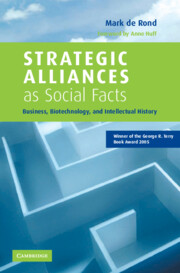Book contents
- Frontmatter
- Contents
- List of figures
- Foreword by Anne Sigismund Huff
- Acknowledgements
- Introduction
- 1 Paradoxes of alliance life
- 2 The context of drug discovery
- 3 Through the looking glass 1: Rummidgen and Plethora
- 4 Through the looking glass 2: Cambiogen and Plethora
- 5 Through the looking glass 3: Bionatura and Pflegum Courtal
- 6 Putting two and two together: revisiting theory and practice
- 7 Strategy, structure, and structuration: the general in the particular
- 8 The hedgehog and the fox: the particular in the general
- 9 The legitimacy of messiness
- Appendix: On methodology and definitions
- References
- Index
4 - Through the looking glass 2: Cambiogen and Plethora
Published online by Cambridge University Press: 22 September 2009
- Frontmatter
- Contents
- List of figures
- Foreword by Anne Sigismund Huff
- Acknowledgements
- Introduction
- 1 Paradoxes of alliance life
- 2 The context of drug discovery
- 3 Through the looking glass 1: Rummidgen and Plethora
- 4 Through the looking glass 2: Cambiogen and Plethora
- 5 Through the looking glass 3: Bionatura and Pflegum Courtal
- 6 Putting two and two together: revisiting theory and practice
- 7 Strategy, structure, and structuration: the general in the particular
- 8 The hedgehog and the fox: the particular in the general
- 9 The legitimacy of messiness
- Appendix: On methodology and definitions
- References
- Index
Summary
If you come out of the collaboration with more knowledge than you had when you went in, even if you haven't achieved the objective, the alliance may still have been successful … it is learning that renders it successful.
(Green, Plethora, March 1998)A joint programme between Plethora and Cambiogen, both successful companies in their own right, was the unusual outcome of a much less significant partnership of Plethora and Myco Pharmaceuticals, in early 1995. Myco, founded in 1992, specialized in anti-fungal research (mycology is the scientific study of fungi) and had entered into various collaborative research efforts with academic institutions until 1993, when it opened up its own laboratories in Cambridge, Massachusetts. Having received substantial funding from The National Health Institutes, Myco began to actively search for pharmaceutical partners and approached, amongst others, Plethora. A strategic alliance was negotiated and active collaboration began on 1 March 1995, although the formal agreement was backdated to 1 January. Plethora decided to purchase a 20 per cent equity stake in its biotech partner. The primary objective driving the collaboration, which was to remain unchanged throughout the next four and a half years, was to search for a broad-spectrum drug for treating fungal infections in humans. Myco was, at the time, one of the most prominent research groups worldwide in fungal genetics.
- Type
- Chapter
- Information
- Strategic Alliances as Social FactsBusiness, Biotechnology, and Intellectual History, pp. 82 - 102Publisher: Cambridge University PressPrint publication year: 2003



